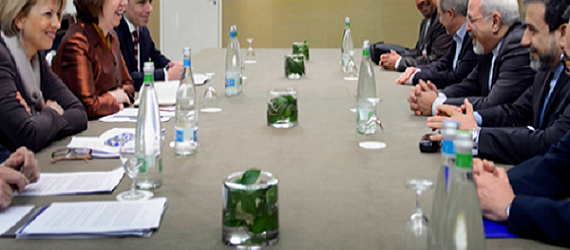While most of us in America were sleeping, U.S. and Iranian officials were in Geneva the night of November 24 hammering out the latest agreement over Iran’s nuclear ambitions. Americans waking up to the New York Times the next morning learned of a “sharp negative reaction” to the deal by Israel and Saudi Arabia. How are Americans to read the controversy among U.S. “allies” surrounding the November 24 deal?
History proves repeatedly that in times of austerity, those who rule are the last to starve. Sanctions are hurting the people of Iran more than its leaders. Even worse for U.S. policy, Iranians blame their economic hardships on the West, not their own politicians.
On the one hand, Hassan Rouhani was elected on an economic platform, which suggests Iranians are choosing leaders who can reverse the sanctions. On the other, actors in the West seeking to dismantle the nuclear program altogether will find that even liberal Iranians stand behind the ruling ayatollahs when it comes down to the simple right to enrich.
We should ask repeatedly what the U.S. seeks to achieve by the sanctions, on what moral ground the policy stands, and on whose insistence the strategy is employed. The last question begs a closer analysis of the pressure being directed at the U.S. from its “allies” in the region.
Benjamin Netanyahu of Israel called the November 24 deal a “historic mistake” that allowed Iran to continue to operate as a “terror factory”. The Saudi government said it felt deceived by U.S. officials over the deal, and that it would act on its own if needed to oppose Iranian influence in the Middle East. Israel also vowed to act alone to “defend itself” should Iran achieve weapons-grade uranium.
The Obama administration should ignore these reactions. Domestic politics in Israel necessitate the “right to defend” response exhibited by Netanyahu. Israel also stands to gain from the information a more strict monitoring program of Iranian nuclear plants will provide, as agreed upon in the November 24 deal.
Saudi Arabia is worried about Iranian influence in general, and only specifically in arenas such as Syria. The nuclear issue is a longer-term concern. Riyadh will continue to sell its oil to the American market, and will continue to shop there for state-of-the-art weapons. There is no implicit advantage to a Saudi-dominated Middle East over one in which a powerful Iran cooperates with the U.S. on key issues. The U.S. gains nothing from representing Saudi interests in the debate over Tehran’s nuclear capabilities.
Indeed, the “historic mistake” that is most likely following the November 24 will come as a result of sabotage from any and all sides. Buoyed by the victory of sanctions relief won in the deal, recalcitrant politicians in Iran will lobby the supreme leader to backpedal on open inspections. Meanwhile, conservatives in the U.S. are prepared to condemn a “naive” Obama upon the first sign of Iranian disobedience. Israel will step in, declaring the final failure of rapprochement and reiterating threats of a unilateral strike. Next the Saudis declare their support for military action and step up efforts to undermine Iranian interests in Syria.
The Obama administration should ignore the anger of its allies and focus its energy to nudge the negotiations forward. Sanctions undermine the Iranian street while justifying the defiance of the current leadership. U.S. “allies” are mired in the nihilism of regional politics and seek U.S. support to the extent that it can quickly settle scores with rivals. America under Obama has pledged to renegotiate its role as a broker in the Middle East from enforcer to facilitator. The path is one that Israeli and Saudi reactions should not obscure.
Brett MARLER
Brett Marler is an editor and writer in Istanbul and a former Fulbright recipient to Turkey. Follow his tweets at @BrettThinking.
























































